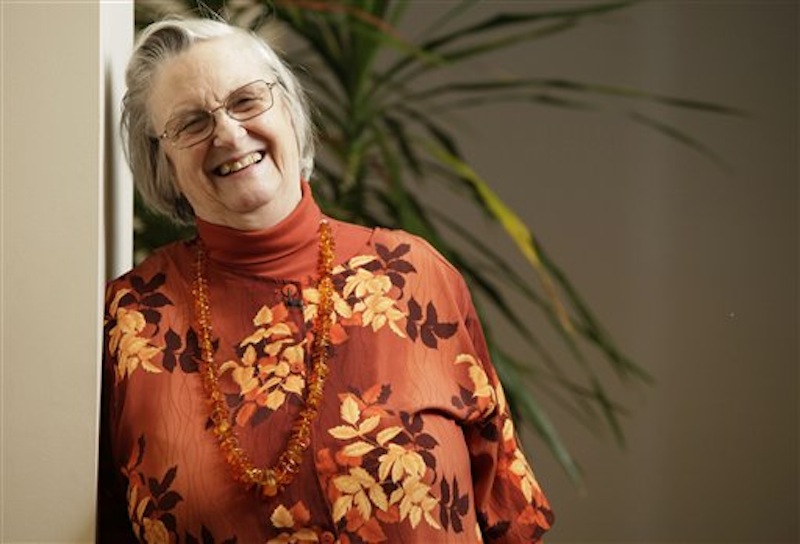INDIANAPOLIS — Elinor Ostrom, an Indiana University political scientist who is the only woman to have been awarded a Nobel Prize in economics, died Tuesday. She was 78.
Ostrom, who won a share of the 2009 prize for her research into how people overcome selfish interests to successfully manage natural resources, died of pancreatic cancer at IU Health Bloomington Hospital, said Michael McGinnis, a friend and colleague who was at her bedside when she died.
Ostrom’s ailing 93-year-old husband, Vincent Ostrom, was brought to her room after she passed away, McGinnis said
“He was able to say goodbye to her and see that she was gone. I think he understood. It was very touching,” McGinnis said.
Ostrom, who along with her husband founded IU’s Workshop in Political Theory and Policy Analysis in 1973, remained active in her research even after learning she had cancer late last year, said McGinnis, the workshop’s current director. He said she had traveled to Mexico this spring only a couple of weeks before her final hospitalization.
“She worked to the very end,” said McGinnis, a colleague of 25 years.
Ostrom shared the 2009 Nobel Prize for economics with Oliver Williamson from the University of California, Berkeley. Both were honored for analyzing the rules by which people exercise authority in companies and economic systems.
Williamson said in a statement that Ostrom was “a great human being,” an inspiring teacher and colleague and accomplished social scientist.
“She had a wonderful sense of joy about the importance of her work that she successfully communicated to others,” he said.
A record five women won Nobels in 2009, but Ostrom is the only woman to have been awarded the economics prize.
Ostrom, who was born and raised in Los Angeles, devoted her career to studying the interaction of people and natural resources. Through her research, she demonstrated how common resources — forests, fisheries, oil fields or grazing lands — can be managed successfully by the people who use them, rather than by governments or private companies.
“What we have ignored is what citizens can do and the importance of real involvement of the people involved — versus just having somebody in Washington … make a rule,” Ostrom said the day her Nobel Prize was announced.
Ostrom conducted field studies of the world’s fisheries, roamed with shepherds in Swiss pastures and trudged around the Los Angeles water basin to distill the essentials of harnessing cooperation to overcome selfish interests.
“What she did was to convince us, those of us who studied the other system — the experts, the state and the markets — to learn to appreciate the creativity of the local communities,” McGinnis said. “Her work cut through ideology in a way that is frankly not very prevalent in today’s public discourse.”
Ostrom was born Elinor Awan on Aug. 7, 1933, in Los Angeles. School officials said she often spoke about what it was like to be a child of the Great Depression, helping her family grow food in a large garden and knitting scarves for soldiers during World War II.
She studied at UCLA, graduated in three years and then worked in the private sector before entering graduate school and receiving master’s and doctoral degrees in political science from UCLA. Ostrom said some people had discouraged her from seeking a doctoral degree when she applied for graduate school, but that she loved studying economics.
Ostrom and her husband moved to Indiana in 1965 when he got a job in the political science department. She later got a job there because, she said, the department needed someone to teach a 7:30 a.m. class.
IU President Michael McRobbie said in a statement that with Ostrom’s passing the school “has lost an irreplaceable and magnificent treasure.” He also said she had brought distinction to IU through her “groundbreaking work.”
McGinnis said that Ostrom donated her share of the $1.4 million Nobel award money to the workshop — the biggest by far of numerous several academic prizes with monetary awards that the Ostroms had given to the group over the years. He said couple had no children and few living relatives.
“Their family was the group of people who worked around the workshop. She was devoted to her students, to her colleagues, to her staff,” McGinnis said. “I really hope she’s remembered for many years.”
Send questions/comments to the editors.



Success. Please wait for the page to reload. If the page does not reload within 5 seconds, please refresh the page.
Enter your email and password to access comments.
Hi, to comment on stories you must . This profile is in addition to your subscription and website login.
Already have a commenting profile? .
Invalid username/password.
Please check your email to confirm and complete your registration.
Only subscribers are eligible to post comments. Please subscribe or login first for digital access. Here’s why.
Use the form below to reset your password. When you've submitted your account email, we will send an email with a reset code.